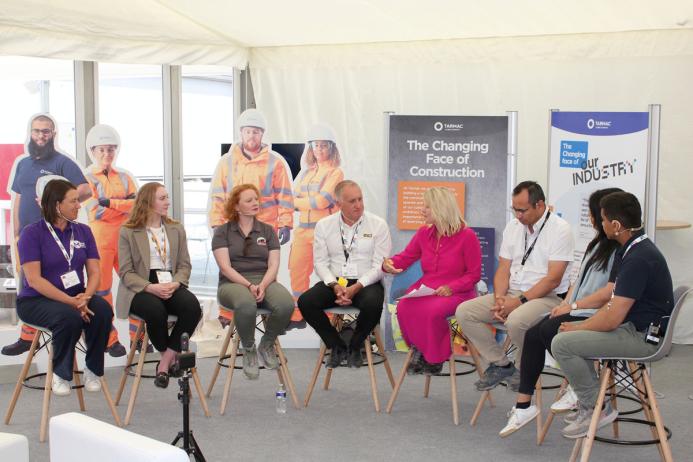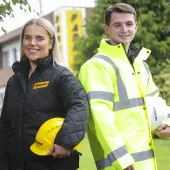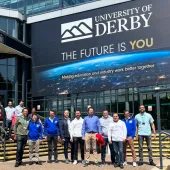The Changing Face of Construction
Whether we like it or not, certain stereotypes exist in the construction industry and, at times, a lack of understanding as to what the industry can really be. This is particularly crucial at a time when we are desperately in need of new and young talent to challenge those preconceptions.
We will always need buildings and bridges, we will always need roads and railways, and for that we need to change the face of construction and usher in a new generation. From a personal point of view, I never considered a career in the industry, and followed the crowd from school to university and beyond. Working in this sector now and seeing the need for a major recruitment drive at a national level, I wonder why apprenticeships were never mentioned at school.
According to statistics from UK's House of Commons Library, 752,150 people participated in an apprenticeship in England in the 2022/23 academic year. This figure has decreased by 3% since the previous academic year. This was the generation that the coronavirus pandemic hit hard and the numbers reflect this.
The good news is that forward-thinking companies are actively seeking to engage and retain talent, something I saw first-hand when taking part in the Changing Face of Construction roundtable at Hillhead 2024. Hosted by professional broadcaster Susannah Streeter, I was in great company. The panel comprised:
- Peter Kay – head of learning and development at Tarmac
- Sonali Sahi – graduate process engineer at Tarmac
- Neeraj Lohana – graduate production engineer at Tarmac
- Lisa Saunders – Minerals Matters and lead of the Mineral Products Association's mental
health working group - Neil Fowkes – early career talent manager at JCB
- Rebecca Brooks – chartered management business degree apprentice at JCB
During this lively discussion, we discussed the importance of attracting talent from new generations, while promoting inclusivity and how we can challenge the status quo and accelerate the pace of change.
This was a unique opportunity to find out what it’s like to be an apprentice today and how companies can build an inspired and energised team ready to tackle the issues we face today and will need to overcome in the future.
Peter spoke of the economic advantage of having a more diverse workforce and how this promotes more creative, innovative thinking.
After leaving school, Rebecca explained how she sought to get some industry experience and so the “natural progression for that would have been an apprenticeship rather than the university route. JCB drew me in from a product side of things,” she said.
“Quite a lot of my friends went off to university and completed degrees through the normal educational route but a couple of my friends after knowing that I did an apprenticeship then went on to find their own apprenticeships as well. It made them think twice about the potential routes that they could take.”
Sonali explained there are challenges to working in a male-dominated industry: “I can go days without seeing a female but that's just the world I work in which is not a problem. I’ve seen people who have been in this industry for 30 or 40 years and are very much maybe stuck in their ways and I'll try and offer something that they've maybe not seen before. It’s getting so much better and it's definitely a shift from when I first started to now – a lot of people are listening to us younger ones and taking our like opinions on board.”
Capturing the imagination of young people can start early. Neil explained that JCB engage with children at the beginning of their education heading into schools with the company’s iconic yellow machines on a smaller scale, of course.
Last year, JCB had more than 6,000 applications for around 200 apprenticeship positions. I think people know JCB because of the brand but what they don't realise is the breadth of opportunities that we offer you know we have over 40 different early career schemes now and there are very few areas of the business where we don't have early career people in there,” Neil revealed.
Lisa shared her thoughts around celebrating the industry: Minerals Matter is an industry-wide initiative aimed at attracting young people into our industry. The average age of our workforce is 56 and primarily, white British males so we have some work to do in terms of obviously making sure we've got succession and talent for the future.”
“There are certain perceptions about our industry and there is still that view that it's kind of dirty, mostly people driving around in trucks. People don't often think about the other roles – we've got technical roles, engineering roles and so much more.”
As with Rebecca and Sonali, Neeraj is proof that apprenticeships work and these young people are exactly what we need. In fact, Neeraj said, “My sister was at school and was deciding whether to do an apprenticeship or go through the traditional degree route. She was saying there not many women in chemical engineering industry and I gave Sonali as an example to her. It’s all about role models.”
The industry is changing and while we’ve still some way to go, we can learn a lot from those who offer structured apprenticeships that create a workforce who will make their mark on the landscape both near and far.
You can watch the full Hillhead 2024 Roundtable: The Changing Face of Construction here.







